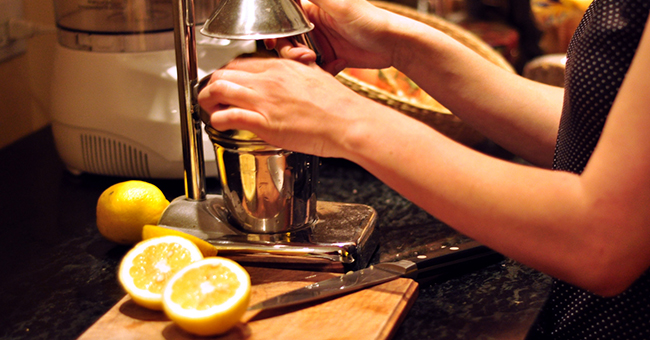What’s the use in buying inventive, obscure spirits, practicing advanced techniques or developing interesting recipes if you pour cocktails using low-grade, sugary juices, stripped of anything natural? There’s little. Freshly squeezed juice can make all the difference for the taste and quality of cocktails. If you’re willing to make the switch to housemade juice, you might find yourself overwhelmed by the variety and range of juicers that are out there. We asked experts to weigh in on how to determine the best juicer to suit your needs and budget.
First, understand what’s out there
There are several kinds of juicers. Among them: press down, centrifugal, masticating and hydraulic juicers. Press down juicers are the simplest and highly manual — the name tells you all you need to know. Using leverage and human force, you can thoroughly squeeze juice from a half of a citrus fruit at a time; it’s tedious but cheap and effective if your fresh juice needs are fairly minimal.
Centrifugal juicers use a spinning blade to turn produce to pulp and a spinning motion that separates the of juice from the pulpy mass. “Centrifugal juicers break the most cell walls, giving you a volatile juice that oxidizes quickly, and a thicker, opaque color,” says Jennifer Colliau of Small Hand Foods. Despite this breed’s pronounced drawbacks, they are the among the cheapest professional-grade juicers.
Masticating juicers, in contrast, more effectively extract juice. By using a horizontal design in which juice is pushed down a tube, augers crush the produce so that nearly every drop of juice is extracted. They “break the cell walls into larger pieces, and therefore provide a clearer juice when strained well,” says Calliau.
Hydraulic juicers yield the most consistent, clear and, according to Colliau, “tasty” juice. They use a process call trituration to break down fibrous matter of the produce through grinding, mashing and shredding — the hydraulic juicer sets itself apart by then imposing extreme pressure on the mash, which fully extracts the juice from the pulpy fibers. “They can be prohibitively expensive though,” she says, “and require more labor as the grinding and pressing steps occur separately.”
Then, consider what you need
If you’re looking for a less expensive juicer, and you know whatever you juice is going to be consumed, a centrifugal juicer can be a great option. But don’t count on it to yield juice that will stand the test of time. “A centrifugal juicer has a really fast spinning blade that tears the fruit/vegetables and extracts juice,” says Dylan Maisel of Juice NOLA. “The blade causes both heat and oxidation, speeding up the ‘dying’ process of the juice. Think of an apple after you cut it. It browns, which is essentially the enzymes and nutrients dying.”
As a professional juicer, Maisel prefers masticating juicers, which are called “cold-pressed juicers” because minimal heat is added to the process (i.e. there’s no blade flailing around and getting your produce all hot and bothered). “They extract more juice, have higher nutrient quality, longer shelf life, and are often more quiet,” says Maisel. And yes, they’re more expensive but only by a couple hundred dollars — an investment that both Maisel and Calliau argue is worthwhile if you know you’ll need juices in bulk.
What to look for, specifically
“We peel and juice hundreds of pounds of citrus most weeks making our various syrups at El Guapo Bitters,” says Scot Mattox, founder of the New Orleans-based bitters company. “We have tried several styles over time to find which is the most efficient and can stand up to the punishment of running for hours at a time and not break down.” Ultimately, they tried and loved the Bar Maid JUC-200, a centrifugal juicer. “It’s been a workhorse. Never breaking down, smelling, or overheating … This one has been going strong for a couple of years and shows no real sign of stopping anytime soon.”
Although Colliau uses a hydraulic juicer to meet her needs at Small Hand Foods, she says “For a bar, I’d recommend a press-down juicer for citrus, like a Vollrath or Focus, and for other fruits and vegetables, either a masticating juicer if you will be juicing ahead of time, or a centrifugal juicer if you will juice a la minute.”
In the way of centrifugal juicers, “Breville’s tend to be the best for the price,” says Maisel. If you’re going to make the leap for a masticating juicer, he recommends the Omega VRT350. “[It] does a great job with greens, so it’s a great choice if you juice a lot of greens. Centrifugal juicers tend to get little juice from greens. All Omega juicers are great and are easy to clean which is a big plus when juicing … Both are great choices and I would definitely spend the extra couple hundred if you plan on juicing a lot.”





